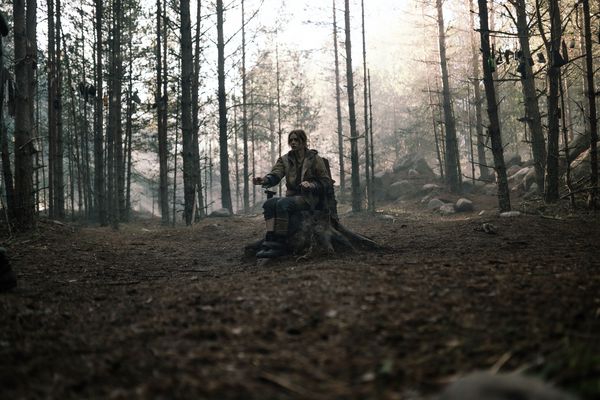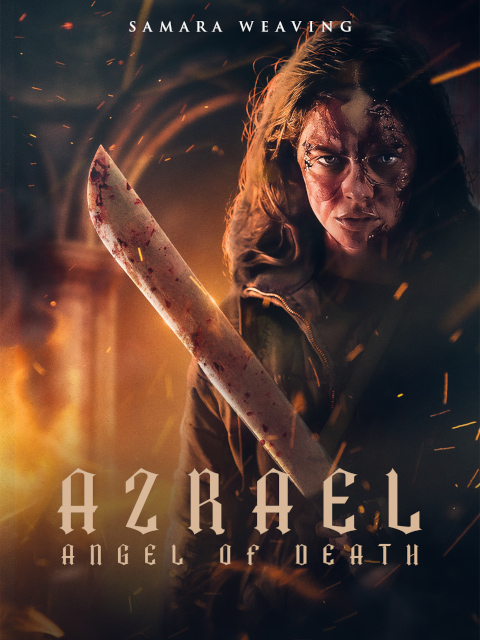Eye For Film >> Movies >> Azrael (2024) Film Review
Azrael
Reviewed by: Jennie Kermode

“Many years after the rapture,” we are told, “among the survivors, some are driven to renounce the sin of Speech.”
The visual world building in EL Katz’s Frightfest-featured post-apocalyptic horror flick is ingenious, weaving together apparently disparate elements which one can imagine might survive in such a situation and, by dint of the fact that most characters don’t speak, avoiding any pressure to explain them. People are living in camps in the woods, yet others still drive. Religious beliefs have shifted dramatically, but there are still denim jeans and waterproof jackets. We get a sense of parallel societies co-existing not that far apart, though we only really connect with one. The is where we find Azrael (Samara Weaving), a prisoner who has escaped along with her love (Nathan Stewart-Jarrett) and is striving to put distance between the two of them and a cult that wants to sacrifice them to the charred-looking humanoid monsters that dwell in the deep woods.

The story is simple, and unfortunately, despite all that good preparatory work on sets and costumes, it never really acquires enough substance for the film to make an impact. Katz takes his highly capable cast – which also includes Katariina Unt as community enforcer Josefine – and puts them through their paces, but mostly physically. Films at this level rarely get more than two weeks to shoot in, so respect where it’s due: there is some serious stamina on display. A large proportion of the runtime involves running about, climbing or crawling. Azrael is pursued by Josefine and others who want to sacrifice her to the things in the woods, for reasons which are never clear. Resembling successors to Event Horizon’s Burnt Toast Man, these creature vary dramatically in their physical abilities according to the demands of the plot, but are consistently savage in the way they tear into human victims, which means that at least the gore fans are likely to be satisfied.
There are some nice touches elsewhere. Peering through the door of a tent, we briefly see Josefine tending to what looks like an injured loved one, and we get a sense of her as someone who has earned her station in the community, not just bullied her way into it. There’s a complete absence of the exploitation of women that one commonly sees in post-apocalyptic scenarios, with little apparent gendered division of labour and everybody pitching in when emergencies arise. In the absence of speech, whistling is used for urgent communication (in the real world, many hunter-gatherer societies prefer it because the sound carries further). The camp is poorly but realistically fortified, with long strings of suspended cans and bottles used to sound alarms.
We get demonstrations of skill, from the weaving of a bracelet to the use of herbs to treat a wound, and these elements reinforce the idea that this is a real society which has developed organically over time. This makes it easier to accept some of the fantastical elements, and their apparent origin in fragments of obscure Biblical lore suggests that the film may be trying to speak to an audience of present day believers. Unfortunately, little effort is made to communicate to others, so that only the most overused tropes come across clearly – and with that in mind, one might just as easily imagine that the religion was cobbled together based on horror film lore. This becomes more problematic in the later stages, as it becomes easier to spot the patterns but harder to decipher what’s supposed to be happening, at least in terms of motive and, dare one say it, point.
Despite the limitations of the script, it’s the acting that carries it, with Unt sympathetic in spite of her role as the aggressor and Weaving holding viewer attention as one of those people who just keeps on going in the most hopeless of circumstances, to the point where it seems more about obsession than simply the will to live. The film feels overlong at 76 minutes but is mostly pretty watchable – one just can’t escape the feeling that it could have been a great deal more.
Reviewed on: 26 Oct 2024

















